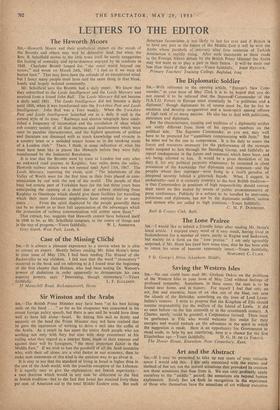The Diplomatic Soldier
SIR,—With reference to the opening article, " urope's New Com- mander," in your issue of May 22nd, it is to be hoped that you do not intend it to be inferred that the Supreme Commander of the N.A.T.O. Forces in Europe must essentially be "a politician and a diplomat," though diplomatic he of course must be, for he has to maintain and develop co-operation and a team-spirit among officers of high rank of so many nations. He also has to deal with politicians, statesmen and diplomats.
But the characteristics, training and tradition of a diplomatic soldier are Vastly different from those of his opposite numbers on the political side. The Supreme Commander, as you say, may well have to be prepared for " unmilitary compromising with facts." But he must not be the one to compromise. It is his duty to assess the forces and resources necessary for the performance of the strategic tasks assigned to him 'through the Standing Group, and faithfully to report inadequacies in the forces and resources which have been, and are being, allotted to him. It would be a gross dereliction of his duty if, for any political purposes whatsoever, he remained in silent possession of the knowledge that diplomats and statesmen—and the peoples whom they represent—were living in a fool's paradise of imagined security behind a gimcrack façade. What, I suggest, is undesirable—and it is certainly contrary to the best British tradition— is that Commanders in positions of high responsibility should convey their views on this matter by means of public pronouncements or press conferences. Publicity is a subject to be handled by statesmen, politicians and diplomats, but not by the diplomatic soldiers, sailors and airmen who are called to high positions.—Yours faithfully,
Bath & County Club, Bath.
C. M. P. DURNEpRD.


































 Previous page
Previous page